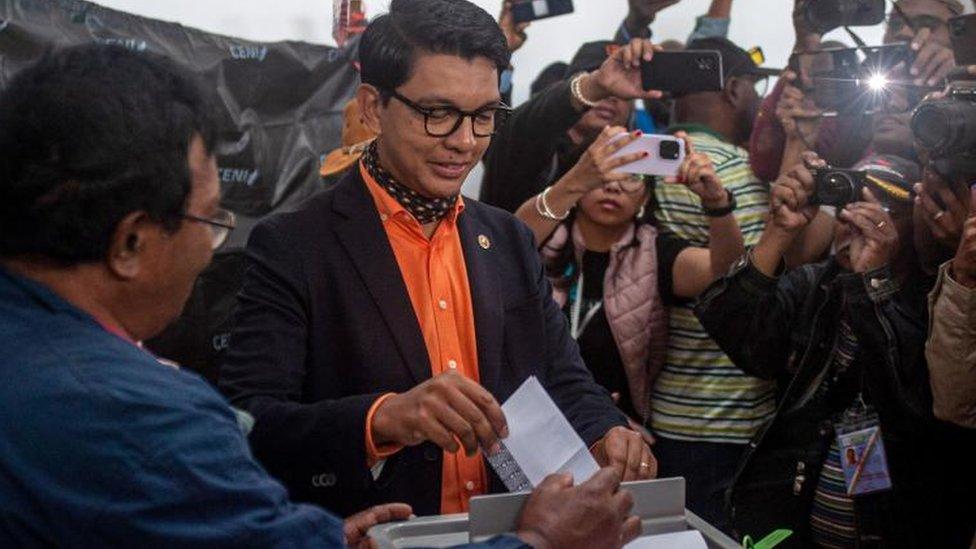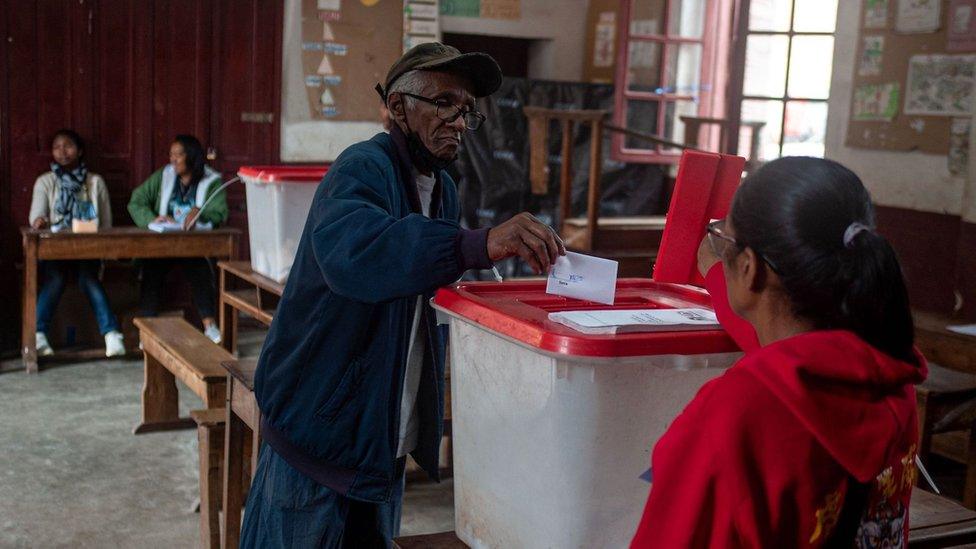Madagascar polls close and opposition shuns votes
- Published

President Andry Rajoelina casts his ballot, as he seeks a third term
Polls have closed in Madagascar following a presidential election that was marred by opposition calls for a boycott and weeks of protest.
Voting took place peacefully, though turn-out was reportedly low, especially in opposition strongholds.
Most opposition leaders called for a boycott of the election.
They denounced President Andry Rajoelina's bid for a third term and raised concerns about the poll's credibility.
Mr Rajoelina dismissed their concerns, and was joined by his family as he voted in the capital Antananarivo's northern neighbourhood of Atmobe.
"A handful of people tried to prevent citizens from expressing their choice. They have the right not to participate but the populations have the right and the duty to vote," Mr Rajoelina said.
Ten of the 12 opposition candidates boycotted the poll.
"We do not recognise these elections and the Malagasy population in its great majority does not recognise them either," said Hajo Andrianainarivelo, who spoke on behalf of the group.
There were six weeks of demonstrations, and clashes with police in the build-up to the election.
A curfew was imposed in Antananarivo on the eve of the poll.
This followed "various acts of sabotage", including the "burning of a polling station", Angelo Ravelonarivo, a police prefect, said.
However, there was a low-key security presence across Antananarivo during Thursday's vote.
Opposition leaders have complained of an "institutional coup" in favour of Mr Rajoelina.
They also said he should be disqualified from the presidency because he acquired French nationality in 2014.
Polling stations in opposition areas were mostly empty, with a a low-key security presence across Antananarivo.
However, people were seen lining up at polling stations in areas regarded as strongholds of Mr Rajoelina and his party.

About 11m people are registered to vote
Roland Ratsiraka, one of the protesting candidates, described the elections to AFP news agency as a "fraud" and a "joke on Madagascar."
A shop vendor in the capital, 50-year-old Mama Pôta, told Reuters news agency that she had no intention of voting.
"I am not going to vote because it is an election that doesn't meet the standards, so what's the point," she said.
A 26-year-old labourer, Rija Ralijaona, said she expected whoever wins to reduce unemployment and create jobs for young people.
According to the World Bank,, external Madagascar is one of the poorest countries in the world, with 75% of people living below the poverty line in 2022.
The country has reserves of cobalt, gold, nickel, uranium and other minerals. However it has struggled with sluggish growth and persistent poverty for decades.
So whoever is going to take over will be expected to address widespread poverty, among others challenges.
With a population of around 30m, just 11m people are registered to vote in Madagascar.
Polls opened at 06:00 local time (03:00 GMT) and closed at at 17:00 (14:00 GMT) on Thursday.
Mr Rajoelina, who officially resigned in September in order to run for re-election, has denied the criticism from opposition leaders and expressed confidence that he will win.
According to AFP, his government has said the protests are motivated by a "desire to overthrow power" and to "sabotage the electoral process".
It has also accused the opposition of "threatening the stability of the country".
After taking power in 2009, Mr Rajoelina became Africa's youngest head of state.
He did not contest the 2013 election but was voted back into power in 2018.
They opposition has vowed to continue protesting until "a fair election" is held.
Results are not expected for at least a week.